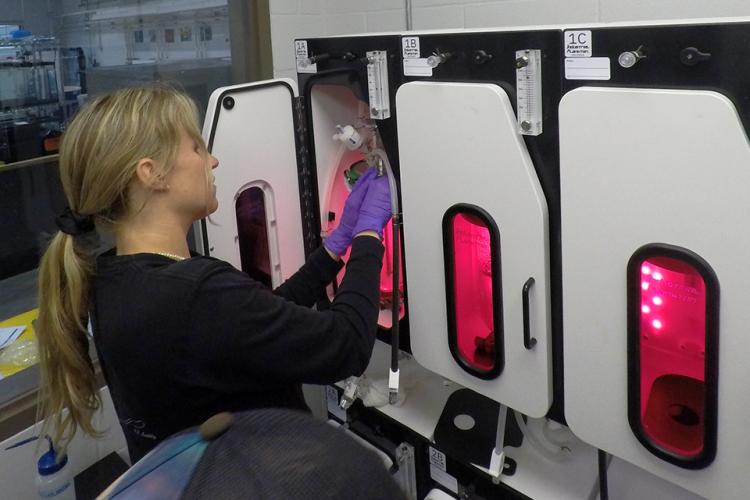A new piece of technology for North Island College seaweed researchers will help their work to support a burgeoning industry.
NIC's Centre for Applied Research, Technology and Innovation (CARTI) has received its new seaweed bioreactor, which provides a stable environment for producing kelp cultures and gives users a lot more time to collect and nurture samples.
Typically, opportunities to collect "sori," or spore patches for kelp are limited to certain times of the year. Usually, it is about a two- or three-month window.
"It's very seasonal," said Logan Zeinert, CARTI senior research technician. "That kind of limits your ability to try to grow kelp in a different season."

CARTI's bioreactor, made by Industrial Plankton, is set up at the Campbell River campus of North Island College
The bioreactors are easy to maintain, to provide consistency and control over factors like pH levels, light or carbon dioxide, and they provide an environment with an extremely minimal risk for contamination. The modular design allows users to scale their operations.
The investment was funded by the BC Knowledge Development Fund (BCKDF) as well as the Canada Foundation for Innovation (CFI), with BCKDF and CFI each contributing $200,000.
CARTI obtained one of the large, 16-compartment units. The equipment provides the CARTI team with more control and certainty when it comes to having a reliable seed supply. Bioreactors are designed to support chemical or biological reactions.
"For seaweed, in particular, you need a stable supply of seeds," said Robert Roulston, founder and CEO for Industrial Plankton (IP), which produces the bioreactor.
Based in Victoria, the company saw an opportunity and a need for aquaculture technology in the face of a changing environment. It started research and development in 2010, and it now supports clients in 35 countries, including over half of the North American-based shellfish hatcheries.
"Over the past decade I've seen the Western world's interest in seaweed go from niche research projects to multiple companies scaling for commercial production," Roulston said. "In my opinion it's the aquaculture sector with the most growth potential and also the biggest potential to impact climate change."
In 2022, the company adapted its technology to start producing bioreactors for newer players in an industry that produces both economic and environmental benefits.
"We've already shipped seaweed bioreactors to five countries and are receiving inquiries from seaweed producers around the world. This industry is just about to hit its stride," said Roulston.
Seaweed is a growing part of this emerging "blue" economy, with the World Bank estimating seaweed aquaculture could directly and indirectly employ 150 million within 40 years.
Already, IP expects to produce even bigger bioreactors for the seaweed industry. While most of the units go to commercial clients, they can be a valuable tool for researchers like CARTI.
Zeinert expects the bioreactor could be used for future CARTI projects such as focusing on popular kelp species in the province with an eye toward coming up with best practices for the industry. Another project could be to set up a biobank of historic kelp populations.
"It provides us an opportunity to innovate and provide access to that equipment," he said, which will mean benefits for the classroom. "It's been a great training opportunity for us and our students."
Among its seaweed projects, CARTI has established a Seaweed Innovation Hub to investigate questions about seaweed seed production, to optimize nursery parameters and innovate toward new methods of seed production for the seaweed sector in B.C.













